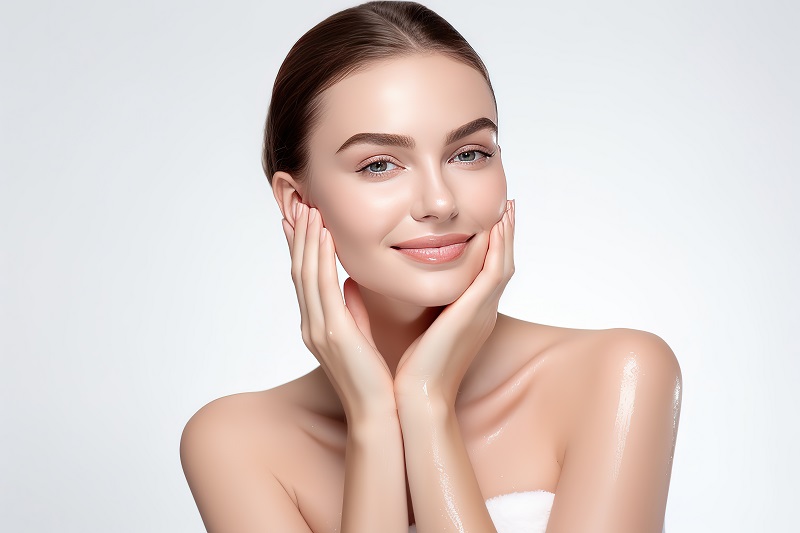Silicone is a synthetic ingredient in skin and hair products derived from silica found in sand. It can heal wounds and smooth the skin, but its cosmetic effects are only temporary. Many dermatologists advocate against silicone use.
This article explains why silicone in skin care is unnecessary and recommends healthier alternatives.

Should I Avoid Silicone in Skincare?
Many cosmetic companies have abandoned the use of silicone in their products, opting for silicone-free solutions. While the ingredient is useful in medical settings, helping to heal wounds and improve scarring, many skincare professionals agree it is unnecessary in skin care. They claim this inactive ingredient mainly serves as filler or “fluff,” not contributing to a product’s skin-enhancing effects.
Silicone in Skin Care: Side Effects
Silicon doesn’t damage the skin, but it doesn’t improve skin health, either. Its occlusive properties and non-biodegradable nature make it a questionable addition to active, rejuvenating ingredients. Skin experts recommend silicon-free products because of the following disadvantages of silicone formulations.
1. Exacerbates Acne
Silicone is an occlusive ingredient, which means it creates a protective, water-repellent film or barrier on the skin’s surface, preventing water loss. While it may enhance hydration, it can also trap dirt, dead skin cells, sebum, impurities, and bacteria within the pores. This may exacerbate acne in people who are prone to breakouts.
Note: Learn what causes acne and how to avoid triggers.
2. Blocks Ingredient Absorption
Because it creates a barrier on the skin’s surface, silicone blocks the absorption of other beneficial ingredients (e.g., antioxidants). Products applied after those with silicones are often ineffective because the active ingredients don’t reach deeper skin layers.
3 Doesn’t Improve Skin Health
Silicone gives the skin a temporary velvety, smooth appearance. However, it doesn’t nourish the skin and has no beneficial effects in the long run. Consistent use may lead to dull and dehydrated skin.
4. May Cause Dry Skin
Silicone’s occlusive properties help prevent transepidermal water loss, but they also impede the skin’s natural cooling mechanism, disrupt sebum production, and prevent hydrating ingredients from entering. This may lead to dry skin and aging signs, such as fine lines, wrinkles, and hyperpigmentation.
5. May Cause Dull Skin
Silicone is difficult to wash off, and long-term use often leads to its accumulation on the skin. It slows cell turnover, trapping dead skin cells and hindering new cells from forming on the surface. The result is a dull, lifeless complexion.
6. Can Irritate Sensitive Skin
Some silicones, especially the commonly used dimethicone, may irritate sensitive skin. The symptoms include redness, itching, and allergic reactions.
Note: Learn which products to use if you have sensitive skin.
7. Environmentally Unfriendly
Silicone is a non-biodegradable, non-recyclable ingredient. It may not break down for hundreds of years, polluting waterways and oceans and potentially harming wildlife. This side effect doesn’t concern one’s skin as much as the environment, but it’s an important reason to avoid it.
8. A Synthetic Ingredient
Silicone is a synthetic ingredient that goes through a complex chemical process before being added to a skincare product. People who prefer natural, plant-derived ingredients may want to steer away from silicone in skin care. Alternatives include aloe vera gel, jojoba oil, squalane, shea butter, seaweed extracts, rosehip oil, and more.
List of Silicones in Skincare to Avoid
It is not easy to spot silicones on a cosmetic product label. Some skin experts recommend watching out for ingredients that end with “one” or “ane” because they may be silicone derivatives.
The following list of silicone derivatives can help you avoid this ingredient in skincare products:
- Dimethicone
- Dimethiconol
- Methicone
- Trimethicone
- Amodimethicone
- Trimethylsilylamodimethicone
- Cyclomethicone
- Cyclohexasiloxane
- Cetearyl methicone
- Cyclopentasiloxane
- Nylon
- Silane
- Triethoxycaprylylsilane
- Triethoxycaprylylsilane crosspolymer
- Cyclopentasiloxane
- Polydimethylsiloxane
- Siloxane
- Dimethicone copolyol
- Cyclohexasiloxane
- Phenyl trimethicone
Silicone-Free Alternatives to Energize Your Skin
Vibrant Skin has a new skincare line featuring silicone-free, paraben-free, sulfate-free, organic, vegan, and microbiome-friendly products to nourish, protect, and rejuvenate the skin.
These innovative formulations are designed according to the latest research on the gut-brain-skin axis, avoiding ingredients that harm or don’t contribute to skin health – such as silicone. The chosen ingredients work synergistically with the body’s natural ability to heal and restore vitality.
From a biome cleanser and photodynamic toner to a clarifying moisturizer and blemish treatment, the new Vibrant skincare line offers everything you need to improve skin conditions, such as acne, eczema, and rosacea, and reverse aging signs.
Conclusion
Silicone has long been a common ingredient in skincare products. Science recognizes it as a safe, non-toxic ingredient, especially useful in medical procedures. However, the rising trend in the cosmetics industry to use clean, natural solutions that improve skin health leaves little room for silicone.
Look for silicone-free, environmentally friendly, and skin-enhancing products in Vibrant Skin’s new skincare line to help your skin find its natural glow.


